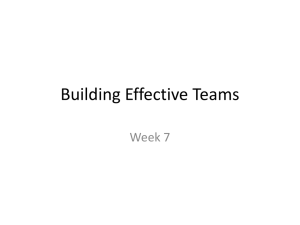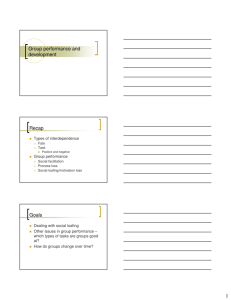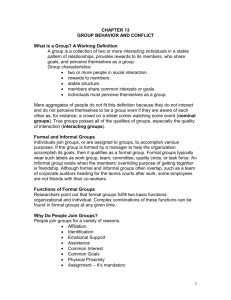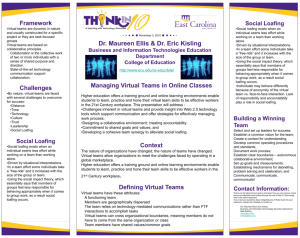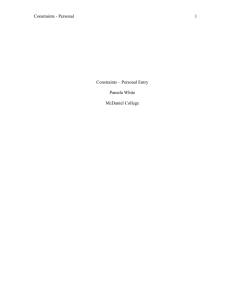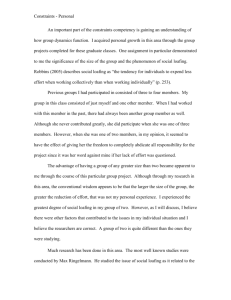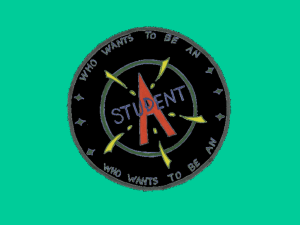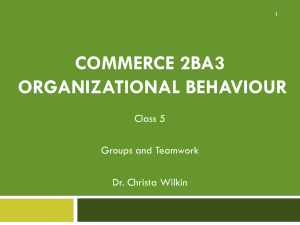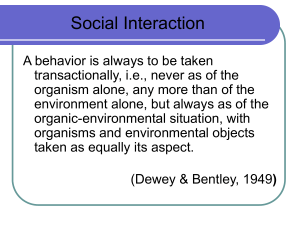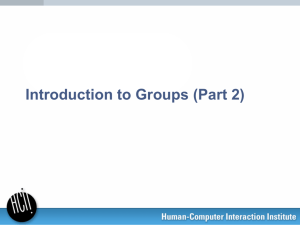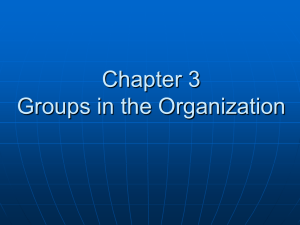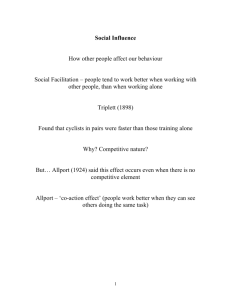Social Loafing and Freeriding in Online Learning Groups
advertisement
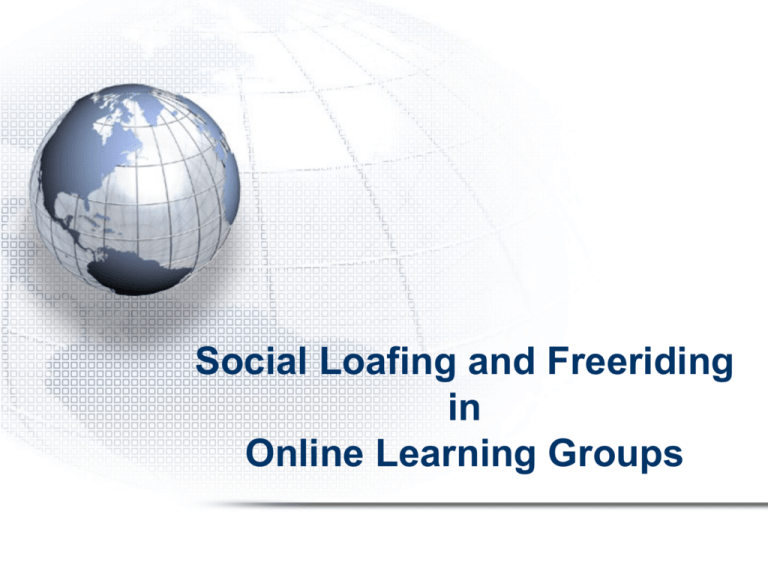
Social Loafing and Freeriding in Online Learning Groups Who we are… Sherry L. Piezon Robin Donaldson Learning Groups What are some reasons for including group work in online learning environments? Definitions Social loafing Tendency to reduce individual effort when working in groups compared to the individual effort expended when working alone (Williams and Karau, 1991). Freeriding An individual does not bear a proportional amount of the work and yet shares the benefits awarded to the group (Albanese and Van Fleet, 1985; Jones, 1984). Review of Literature Ringelmann Effect Inverse relationship between the size of the team and the effort expended Clapping and Shouting Latane, Williams and Harkins, 1979 Social Loafing Antecedents Task Visibility Task Interdependence (individual contribution) Procedural/Distributive Justice Work Group Size Group Cohesiveness Perceived Coworker Loafing Review of Literature Perceived Social Loafing ”Regardless of actual behavior, it is the perception of coworker loafing that is salient” (Mulvey and Klein, 1998). Self-reporting Social Loafing Sucker Role Kerr, 1983 Sucker Effect Social Loafing Antecedents Task Interdependence Definition: Individual’s work becomes more interdependent with other individuals work Problems: More difficult to sense personal achievement Recommendations: Clarify roles/responsibilities Make tasks meaningful for individuals Teamwork is prerequisite to accomplish goal Individual feels they are contributing to “end” goal Task Visibility Definition: An individual’s belief that their effort is being observed by their supervisor Problems: Individuals disregard performance standards Less likely to engage in self-regulation Recommendations: Assign team roles (i.e., leader, recorder, editor) Define team member milestones (instructor/team) Members establish individual performance targets Group establishes communication procedures Develop methods for solving problems Establish individual and team logs Utilize Microsoft Project (experienced learner/project oriented) BB, discussion board, and team sites Team Log Distributive Justice Definition Perception of a fair distribution of rewards and compensation among group members Problems: Negatively related to social loafing Rewards limited to participation/grades If unfair distribution perceived; individuals adjust contributions accordingly Withhold efforts due to benefits vs cost Recommendations: Reinforcement vs Punishment Explain/distribute reward/grading system Grading/reward systems (individual and group) Procedural Justice Definition: Perceived fairness of the procedures or policies that surround distributive justice Problems: Increases freeriding Perceived lack of fairness positively correlated to social loafing Recommendations: Open door policy (no punishment) Combination grade Group project Individual contribution to final project Participation – Attending group meetings – Discussion boards Meeting group and individual schedules/deadlines Group Size Definition: Individuals feel their contributions are more crucial to success in smaller groups Problems: Contributions not important Others will pick up slack in performance More likely to “hide in the crowd” Difficult to assess individual contributions in large group size Recommendations: 2 (novice learners) 3-5 (experienced in online environment) Consider group member schedules and time zones when establishing groups Group Cohesiveness Definition: Ability of the group to bond together as a whole Problems: Individuals exert less effort since inputs are not perceived as essential Less likely to accomplish group goals Positive correlation to social loafing No reciprocal behavior Contributions of individuals are not valued Recommendations: Require high levels of accountability Alternate group roles (i.e., leader, recorder, editor) Balance group member skills and knowledge Encourage group discussions Ensure individuals/groups receive meaningful and immediate feedback Provide rewards for group performance Provide performance data for comparison with other groups Make provisions for social validation Perceived Coworker Loafing Definition: Extent that group members believe that other group members are engaging in social loafing Problems: Actions are based on perceived actions of fellow group members Negative influence on other group members Mere perception (accurate or not) may reduce individual motivation Increases likelihood of freeriding Increases likelihood of sucker effect Increases likelihood of sucker role Recommendations: Publicize individual contributions Submit weekly journals Individual contribution Team contribution Team leader assessment of team members Instructor evaluates and provides feedback on both individual and group analysis of contributions Group Domination Definition: One or more members more vocal and assertive than other group members Problems: Contributions are not welcome Knowledge is insufficient Intimidates other group members Recommendations: Alternate group roles: Leader Recorder Researcher Editor Required reading on group cohesion, cooperation techniques, and effective collaboration techniques Provide opportunities to increase collaborative efforts and publicize results Social Loafing Future Research Questions?
